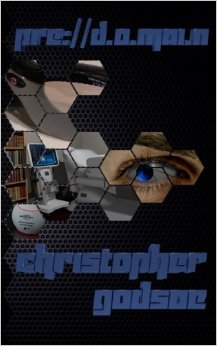With his sci-fi thriller pre://do.mai.n, author Christopher Godsoe isn’t interested in painting a dystopian vision for the future — society as we know it can be ugly enough. That is, until you’re prepared to fight for it.
pre://d.o.mai.n • By Christoper Godsoe • 395pp • Released December 2nd, 2013
Note: This is my first in a series of three posts covering the launch of pre://do.mai.n, available online today. Up next: a wide-ranging, in-depth interview with Chris on the book and the story behind his writing process.
Over nearly 400 pages, pre://do.mai.n is a conflicted, sometimes cynical, but nevertheless fun and fast-paced story that artfully jousts with the shared optimism and skepticism we have for our near future.

It gets more complicated from there: In the near future of pre://do.mai.n our smartphones can display alternate realities, our eyes can record and receive information, and self-driving cars have arrived, though all manner of advancements are endlessly exploited in equal turns by both criminals and corporations, each one fighting to use the tools for what they deem as justified causes, each one willing to ignore or event accept the destructive consequences of their own selfish quests.
In the middle of it all is Miles Torvalds, a 21-year-old Maine resident and technophile whose mother is dying from the now-curable “big C”. Because Miles and his parents are roughly middle class — the book does a subtle job of showing the real middle class, not the mansion-owning, BMW-driving middle class of TV sitcoms — they’re unable to afford the cure, leaving the increasingly cynical Miles with a choice: Should he use an expensive and powerful gift from his cousin (and best friend) to try and save his Mom, and by extension his broken family? Can he bend the technology — and the people and organizations that control it — to his simple goal — through pure determination.
These are heavy themes, though to its credit, pre://do.mai.n doesn’t make the answers easy or quick, and nobody’s a convenient “roll your eyes” hero in the process. That said, it’s also a fun ride, with shots of black and crude humor throughout. There’s even true love and friendship, in a surprising amount of forms — between fathers and sons, cousins; even cyborgs and things beyond human are human enough to feel.
In his first full-length novel, Godsoe skillfully paints a picture of near-future technologies, while drawing from hot topics in today’s news to challenge his characters to overcome adversity, relax their own strangleholds on the past, question their current reality, and maybe, just maybe, find a cure without losing themselves in the process. Through all the cynicism over the corruption and ignorance of government and technology, it’s a pretty optimistic future if our human — and even our non-human — selves can reflect, regret, revise, and still dream.
I had a chance to interview Chris to coincide with the launch of pre://do.mai.n in bookstores and online today. I broke my interview up into two parts: Part 1 covers the book and is online today; Part 2 covers Chris’ experiences writing the book and appears here on Wednesday.


Leave a Reply